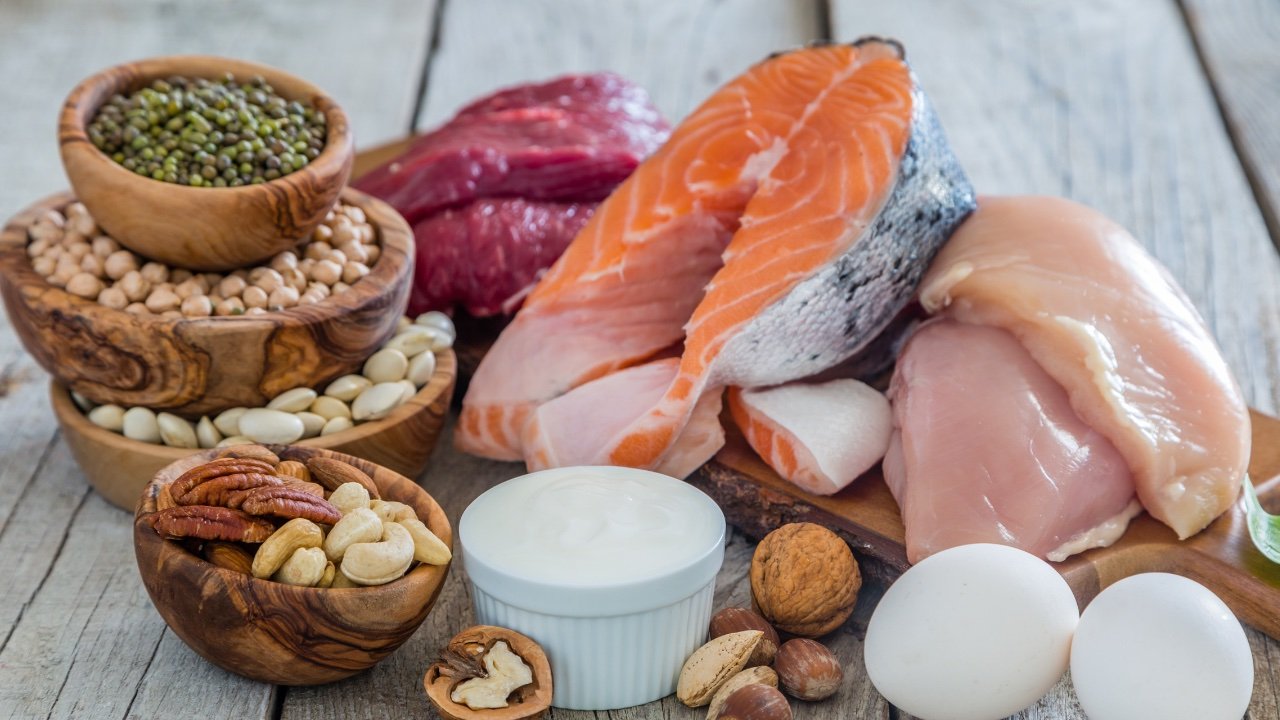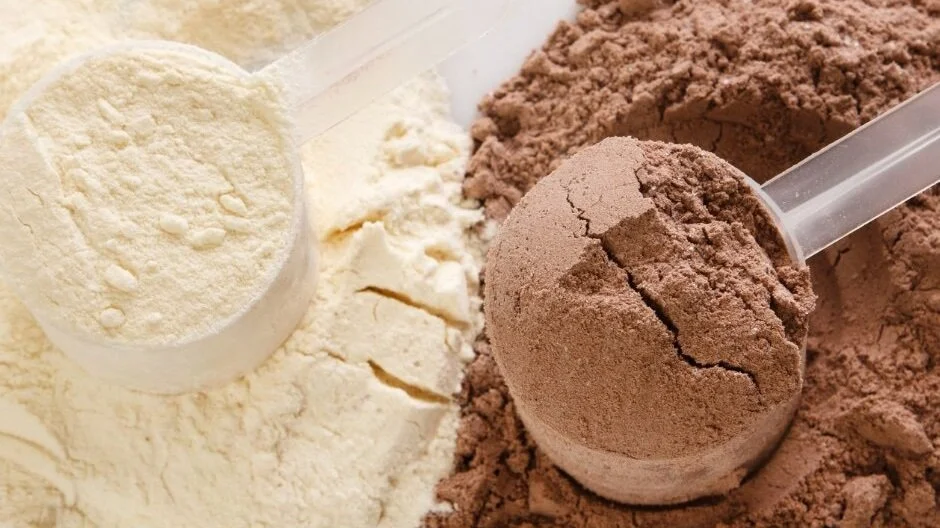Is Protein Powder Safe During Pregnancy? A Dietitian Answers
Love a protein shake but wondering ‘is protein powder safe during pregnancy?’
It’s no secret that we need more nutrients during pregnancy, including protein.
And yet, often our body seems to be working against us - whether it’s ‘morning’ sickness, food aversions or lack of stomach space in the third trimester, finding sources of protein you actually feel like eating can be tricky.
So, is it OK to top up your diet with some protein powder when you’re pregnant to make sure you’re getting enough?
The answer is…it depends (sorry, stay with me!).
Firstly, why is protein important during pregnancy?
Protein is the major structural element of all the cells in the body, so it’s no surprise protein needs increase during pregnancy to support all of the changes that occur during this time - from expansion of blood volume to fetal growth and development.
Protein also helps to keep blood sugar levels steady which can help reduce morning sickness (low blood sugar levels are known to be a trigger for nausea during pregnancy) and is also important in managing gestational diabetes.
It’s also more filling than carbohydrates and fat, so having protein regularly throughout the day can help manage appetite and avoid excess weight gain during pregnancy.
How much protein do pregnant women need?
In Australia, the RDI for protein in pregnancy is 1g/kg/day (60g/day for a 60kg woman) for the second and third trimesters (there is no additional requirement set for the first trimester).
This is compared to 0.75g/kg/day (45g/day for a 60kg woman) for non-pregnant women.
However, some studies have concluded that pregnant women and their babies would likely benefit from a higher protein intake than what is set in the guidelines.
What if I have a total aversion to protein while I’m pregnant?
This increased need for protein during pregnancy is often accompanied by a total aversion to high-protein foods such as meat, chicken, seafood and eggs.
But the good news is, it’s actually not all that difficult to get enough protein, even if you can’t stomach meat.
Many foods contain protein, even if we don’t typically think of them as ‘protein’ foods.
For example, one cup of milk and one piece of wholegrain bread with peanut butter provides around 15 grams of protein, one quarter of the recommended daily intake for pregnant women.
Amount of protein in common foods and drinks:
Milk – 8g per 250ml cup
Yogurt – 8-20g per cup (Greek yogurt is higher in protein)
Cheese – 6g per slice (25g slice)
Meat, poultry and fish – 8g per 30g serve
Eggs – 6g per egg
Soy milk - 8g per cup
Pasta (white or whole wheat) – 8g per cup (cooked)
Wholegrain bread – 4-6g per slice (white bread is around 2g per slice)
Bean & legumes (such as chickpeas, lentils, kidney beans and green peas) – 6g per 1/2 cup (cooked)
Seeds (such as chia seeds and sesame seeds) – 3g per tablespoon
Tofu – 8g per 100g
Nut butter – 5g per tablespoon
Oats - 3.8g per 30g serve (uncooked)
Protein powder - 20-25g per 30g scoop
While it’s best to meet your protein requirements through whole food sources, if that’s not possible, a protein supplement such as protein powder or protein shakes can be a convenient way to add some additional protein to your diet.
But, some protein powders may not be suitable during pregnancy. Here’s what you need to keep in mind when choosing a protein powder.
What are the potential issues with protein powder in pregnancy?
Added micronutrients
Some protein powders have vitamins and minerals added to them to provide a broader range of nutrients.
While for most people this is beneficial, it can be an issue for pregnant women who may be taking a prenatal vitamin or supplement that contains these same vitamins and minerals.
Because having too much of certain micronutrients can be dangerous during pregnancy, for example, iron, zinc and vitamin A, it’s not a good idea to take a protein powder that also contains added vitamins and minerals (unless specifically recommended by your healthcare professional).
Sugar
Protein powders often contain large amounts of added sugar to make them more palatable.
Small amounts of sugar during pregnancy are fine, however, having too much sugar can increase the risk of excess weight gain which can be bad for both you and your baby.
Artificial sweeteners
Many protein powders contain artificial sweeteners instead of, or along with sugar. While the jury is still out on whether artificial sweeteners are safe during pregnancy, they offer no nutritional benefits to you or your baby and can encourage sugar cravings and a preference for sweet tastes.
For this reason, artificial sweeteners are likely best avoided or at least limited during pregnancy.
What about heavy metals in protein powder?
There have been reports recently of protein powders containing high levels of heavy metals such as arsenic, cadmium, mercury and lead.
While this sounds scary, further research found that a typical intake of protein powders wouldn’t result in adverse health effects due to heavy metals.
Whey protein powder was found to have lower levels of heavy metals compared to plant-derived protein powder, so that may be a better option if you’re concerned about exposure to heavy metals.
And if you really don’t want to risk it, you can of course opt to get your protein from other sources.
Best sources of protein during pregnancy
The best way to get plenty of protein and meet your nutritional needs during pregnancy is to eat a balanced diet with a wide variety of whole-food protein sources such as meat, chicken, fish, eggs, dairy products such as milk and yoghurt (full fat or reduced fat), legumes, tofu, nuts and seeds.
A healthy diet based on these foods is likely to be more effective than even the best protein powder in providing all the essential amino acids and nutrients you need for a healthy pregnancy.
If you do choose to add protein powder to your diet, the best options are those with minimal added ingredients, such as plain whey protein powder.
Protein powder can be added to smoothies (made with fruit, milk and yoghurt), porridge, stirred through yoghurt or cottage cheese or simply made into a shake with milk or water.
Hopefully by now I’ve answered the question ‘is protein powder safe during pregnancy’.
But, as everyone is different, it’s best to discuss your daily protein intake with your healthcare professional or prenatal dietitian to ensure you’re getting the appropriate amount for you and your baby.
While too little protein can be an issue, too much can also impact your baby’s long-term health.








